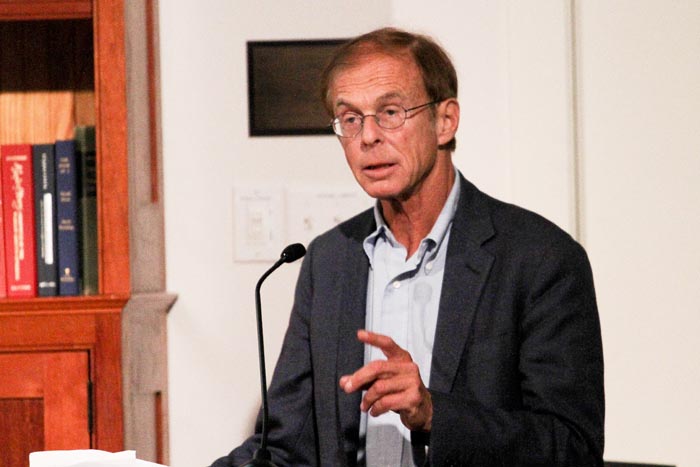Could it be that western system of market capitalism has broken down so badly that its failings present a threat to democracy itself?
That was the question left ominously hanging at the end of a presentation by three eminent economists — two from the Harvard Business School and one private forecaster — at the Martha’s Vineyard Hebrew Center on Thursday night.
The author of a dozen-odd books, convener of the Summer Institute panel and third speaker, professor of business administration at Harvard Business School, Joseph Bower, said it was a question worrying not only him, but a lot of other experts.
“We think the system is not working . . . well enough to support the democratic governments,” he said.
When one looked at where economic growth was happening in the world, many of the successes were in countries following some form of state capitalism, he said.
Meanwhile, in the west, and most particularly in the United States, economies were stagnant, wealth was increasingly unequally distributed, and the middle class was fast disappearing along with jobs.
“Too many people aren’t getting the benefits of economic growth,” Professor Bower said. “People do irrational things when they’re frightened. I think we have a big political problem, not just an economic one,” he added.
His conclusion was less surprising, but all the more dismal, given the facts that had been laid out by the panel in the previous 90 minutes.
The presentation was divided up such that Mr. Bower’s Harvard colleague David Moss, who teaches economic history — essentially, he noted, the history of financial crises — began with a lesson on economic crises past.
Economic crises, he said, almost always related to failings in the banking sector, had been a “drumbeat through American history,” occurring on average every 15 to 20 years. He listed the big ones: 1792, 1797, 1819, 1837, 1907, and then the biggest of all the Depression of 1929 to 1933.
But after that, he said “something remarkable happened . . . they just stopped.”
The reason was that America got its regulatory house in order. Banks were tightly regulated, while other parts of the economic sector were allowed much freer rein, a regime which drove American innovation for 50 good years.
Then the political mood “became stuck in a deregulatory mind-set,” even as the economy became exposed to “supersized financial institutions” of a type the country had never before seen, Mr. Moss said.
He offered statistics on their size: In 1980, they accounted for about 1.6 per cent of gross domestic product, about the same as in 1950. By 1990, this had grown to 4.5 per cent, and by 2007, just before the crash, to 22 per cent.
All hugely leveraged and inadequately regulated, leading to the biggest economic crisis since the Great Depression.
Unless they were properly regulated, Mr. Moss warned, it would all happen again: “If we get the regulation wrong, if we fail to be aggressive with the biggest systemic threats, I think what you’re going to see over time is we’re going to have a larger boom-bust cycle, big ups, big downs, than we’ve seen before. It will look more like the 19th century.”
The story continued into the present with Allen Sinai, chief global economist, strategist, and president of Decision Economics, a global economic advisory firm.
After the golden decade from 1991 to 2000, he said, “It has essentially been all downhill for this country.”
The recession of 2001 was followed by weak growth, and since the great recession technically ended in June 2009, growth had been the weakest since World War II, and now was running at only about one per cent.
He recited the dreadful numbers on the deficit, debt, unemployment, consumer spending, bank lending, the failure of the fiscal stimulus and the tactic of printing money. He drew comparisons with other basket-case economies of the present and recent past — Japan, Greece, Argentina, Chile — and said “the parameters are very similar.”
He did a quick tour of world economies, referring to the U.S., Japan and Europe as “the former-haves” of the world.
“We’re losing out relative to lots of other parts of the world,” he said.
There was real risk of another recession in 2013, he said, and the decade would go down as probably “the worst ever seen.”
He saw his clients beginning to move out of the U.S. dollar, to places like China, Canada, the Australian dollar, the Swiss franc.
It might, Mr. Sinai said, be “the leading edge of attack on U.S. debt and ultimately, stock markets.
“Is it possible, our system . . . in the modern global world is no longer up to the task, no longer able to grapple with the crisis? There’s something really wrong and I’m really concerned,” he said.
Mr. Bower gave the good news, at least from the overall global perspective. None of it, however, related to America.
The World Bank, he said, still was forecasting good global growth, out to 2030, most of it in east and south Asia.
Developing countries’ share of global gross domestic product would rise from 23 to 31 per cent. Average incomes in the developing world would increase from 16 to 22 per cent of those in the rich countries, a phenomenon he described as “remarkable progress.”
And the global middle class would grow at a “just amazing” pace, tripling in size from 400 million people to 1,200 million.
Then the downside. Sub-Saharan Africa would go nowhere. Rapid population growth and stagnant economic growth would likely make more failed states, like Afghanistan and Yemen, potential threats to this country.
And American businesses — he played interviews with a number of major corporate leaders to make this point — would continue to export jobs and drive down the relative wages of most Americans, in fact of low-income workers in most developed countries.
Mr. Bower offered statistics. Between the late 1970s and the present the gap between the richest and poorest Americans had grown 40 per cent. Almost all the growth in wealth in the United States had gone to one per cent of the population. The middle class is disappearing.
The same was happening to a greater or lesser extent in most of the developed world.
Only in a couple of countries, Norway and Germany — notably two western economies in reasonably good shape — had inequality decreased.
The takeaway message was clear: Unless some way could be found to stabilize capitalism and more evenly distribute its gains, there was big trouble ahead.





Comments (1)
Comments
Comment policy »